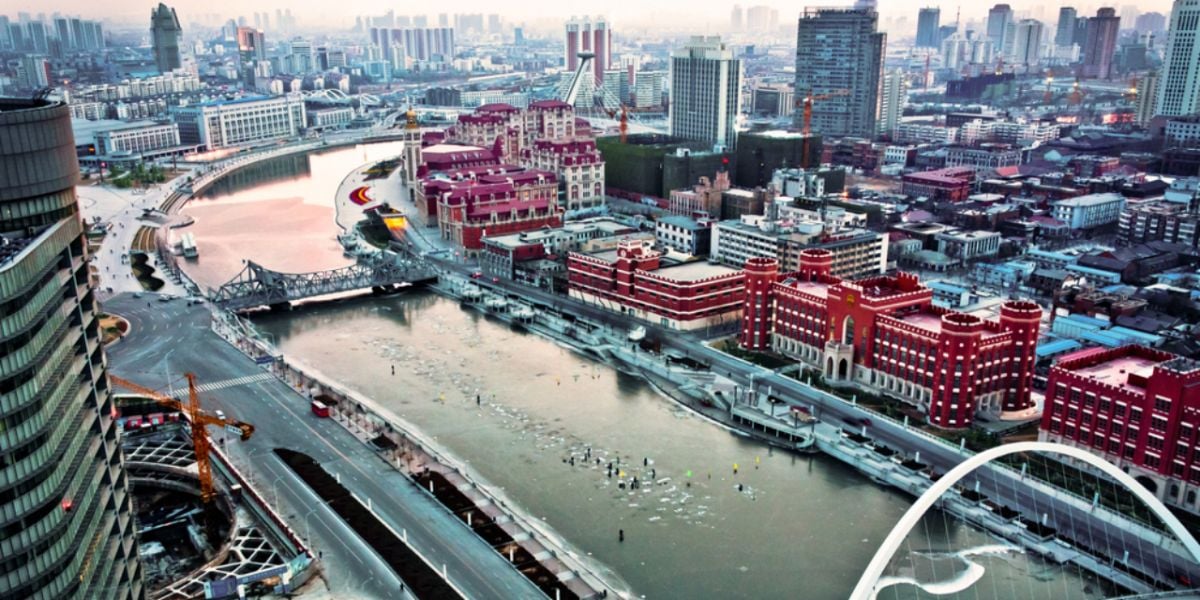
Tianjin is a first-tier coastal city in northern China and a busy and crowded metropolis with over 15 million inhabitants. Whether you are moving to Tianjin for a short time or planning a long-term stay, you should not have a problem finding suitable accommodation. Prior to the move, however, it's recommended that you learn more about the city, accommodation options, rent prices, and the housing market in general.
Which are the best neighborhoods for expats in Tianjin?
Tianjin covers an area of over 11,760 square kilometers and is divided into six main urban districts: Heping, Hexi, Hebei, Nankai, Hedong, and Hongqiao.
Heping is the city's central district, home to high-rise office buildings, high-end hotels and colonial architecture. It is the most active of the city's neighborhoods when it comes to tourism and is also the main shopping and dining area. Rent prices here would, naturally, be higher than in other districts.
Hedong district is located on the Hai River and houses the city's central railway station and two of its most prominent universities. It's not a particularly popular residential neighborhood but offers a variety of less expensive accommodation options if you choose to settle here.
On the north side of the river lies the Hebei district. Located further from the city center, it is a good option for those who want to avoid the hustle and bustle and are looking for accommodation on a budget. The biggest neighborhood landmark is Ningyuan Park.
Hexi is a quiet residential area with many schools and universities. It's a popular area for students as well as the neighborhood of choice for those working at one of the city's universities.
Nankai is a busy hub for students as well. Here, you will find Tianjin University and Nankai University, as well as a variety of landmarks.
Hongqiao is one of the smallest city districts where you will find an English boarding school, Wellington College International, and all the necessary amenities.
Binhai is Tianjin's vibrant coastal neighborhood and home to Tianjin Economic-Technological Development Area. This is the city's rapidly developing district and the center for innovation and R&D in the city. Here, you will find plenty of office buildings, and living in Binhai would be convenient if you work for one of the many companies headquartered here.
What types of accommodation are available in Tianjin?
There are lots of accommodation options in Tianjin. You can rent a studio, larger apartment, villas, studios, townhouses, and more. While the city has no shortage of newly-built modern high-rise residential complexes, there are also a great number of older traditional buildings. These may be more interesting to live in if you want to dive fully into the local culture, but you should be aware of potential maintenance issues and other specifics of traditional Chinese housing. First, if you rent an apartment in an older building, your place will most likely have a squat toilet. This is something that may take some adjustment if you are not used
Chinese apartments generally have rather small rooms. Kitchens also tend to be more utilitarian and just big enough to house all the necessary kitchen appliances. Most apartments are equipped with gas, but in some cases, you may need to use an electric cooker. You won't find bathtubs in most apartments in Tianjin — unless you are renting something very expensive. Most apartments come with balconies. However, balconies can be quite small, and most families in China use them for drying clothes and storage rather than as a place to enjoy the views from.
Some expats in Tianjin prefer to live in closed gated communities. In China, these are often referred to as “gardens”. These types of complexes often have lots of facilities within their walls: gyms, coffee shops, kindergartens, and more.
Your choice of accommodation will most likely depend on your budget and the length of your stay in the city. If you are staying in Tianjin for a short time, you can opt for a hotel or an "aparthotel", or even a vacation home. If you plan to stay longer, you can rent a studio, an apartment, or a villa according to your financial means and your family situation. Sharing an apartment is also popular among expats — follow local forums to find apart-mates or those renting out a room.
Rent prices in Tianjin
Rent prices in Tianjin are relatively low compared to other first-tier cities. You can rent a one-bedroom apartment in a good neighborhood starting from 2,500 yuan. Naturally, prices will increase as you move closer to the city center or large business areas. A bigger place will also be more expensive: starting from about 5,000 yuan for a two-bedroom place in a central neighborhood.
If you want to save money on rent, consider moving further away from central areas into the new developing districts. Tianjin, just like most cities in China, is very well connected. This means that you can easily commute to where you need to be by public transport.
Another way to pay less in rent is by sharing an apartment with co-workers, friends or other like-minded individuals you may find on expat forums.
How to pay utility bills in Tianjin?
Utilities in China generally work on a pre-paid basis. To pay utilities, you will need to use a special card that you can top up at a utility meter, bank and other locations across the city. You can check with your landlord about the nearest locations to pay your utilities. Make sure not to lose your utility cards, as these can be quite difficult to replace.
If you find this system confusing, you may also be able to arrange an agreement with your landlord: they will pay for utilities on your behalf, and your utility bill will be added to your monthly rent. This is probably the best arrangement if you are new to the city and this would be your first time handling utilities in China.
If you live in a gated residential community with a management office or concierge, you may also be able to pay your utilities there. This will make things much easier, especially if you are new to China. These types of residential complexes are popular with foreigners — so you may also have fellow expats in the neighborhood to ask for guidance.
How to find accommodation in Tianjin?
You can start your apartment hunt in Tianjin online. Check out websites like Anjuke, 58.com, etc. You can also check expat groups in the city, like Tianjin Expats.
Most apartment ads will indicate how big the apartment is, where it is located, rent conditions (deposit amount) and whether the ad has been posted by a real estate agent or the owner. If you are interested in taking a look at the place, message the post's author with your contact details. In China, the most popular way to communicate online is by using the WeChat app. The app has over 900 million users and is the number one tool you will need for your everyday life in China. WeChat is primarily a messenger app, but you can also use it for shopping online, paying for goods and services via the QR code, and more.
Once you get in touch with a real estate agent or your potential new landlord, they will probably ask you for your WeChat ID. This is why it's a good idea to download the app and learn how to use it before you start your apartment hunt in Tianjin. Using WeChat is fairly straightforward, and the app comes with an adequate English version.
Another way to look for apartments in the city is by visiting different districts and neighborhoods. Once you have found the location you like, you should easily find a real estate agency office nearby. The agency will probably specialize in the accommodation offers in the area, so you will have a better chance of renting an apartment in the area you prefer. If you're looking to rent in gated residential communities, you may also ask the “baoan” (security guard) for any available rentals. The baoan can put you in touch with landlords renting out apartments in the complex.
Important:
Renting accommodation directly from the landlord will help you avoid extra costs such as the agent's finders fee. However, if you're new to Tianjin (and China in general), don't speak Chinese, and are not yet familiar with how things work in the housing market, it will be in your best interest to rent an apartment through a real estate agent. This way, you will have someone experienced representing your interests. Plus, in case of a dispute with your landlord, you will be able to turn to your real estate agent to help resolve it.
Lease agreements in Tianjin
There are several things you will need to pay attention to when signing the lease agreement in Tianjin:
- Most rental agreements are written in Chinese. Some will have a shorter English version attached or a translation line under each line in Chinese. If your rental agreement is written entirely in Chinese, get a translator to provide you with an English copy. Never sign any contract in Chinese if you don't understand the meaning of every clause. Even if your contract comes with an English translation, it may be best to have a translator give it another look just to ensure that the original translation is accurate.
- If you are new to Tianjin, it's best to have a Chinese friend or colleague present when you sign the lease. This way, you will be able to efficiently address any issues that may come up during the signing. Your Chinese friend will also have a better understanding of what to look out for when signing the lease.
- As an expat, it's generally better that you rent a place via a real estate agent. While this does involve additional fees, it may also save you lots of trouble and keep you protected should anything go wrong. In addition, if you ever have a conflict with your landlord, a real estate agent can act as a mediator to help you resolve it.
- When you sign the rental agreement in China there will be an inventory of all the items in the apartment attached to the contract. This includes furniture items, household appliances, apartment decoration, and more. It's important that you give the apartment a proper walk-through and check if all the items on the list are there. If you notice that there is anything missing, let the landlord or the real estate agent know. This is the best way to avoid any future disputes with the landlord when you have to move out.
- Make sure to check the apartment for any damage or wear. If you notice any anomalies, it's a good idea to take a picture of them and show them to the landlord or real estate agent before signing the lease.
- Note that in most cases, you will be asked to pay a two-month deposit upfront when you rent an apartment. If you are renting a place via a real estate agent, you will also need to pay the agent's fee, which normally amounts to half of a month's rent. Make sure to keep your deposit receipts till the end of your lease. You will need them to get your deposit back at the end of your stay.
Useful links:
We do our best to provide accurate and up to date information. However, if you have noticed any inaccuracies in this article, please let us know in the comments section below.








